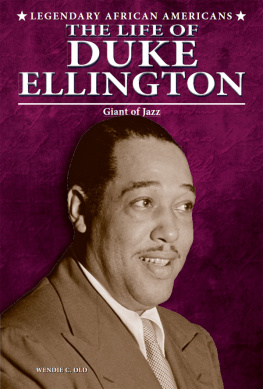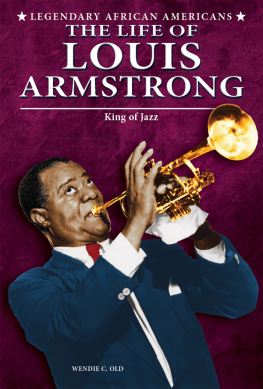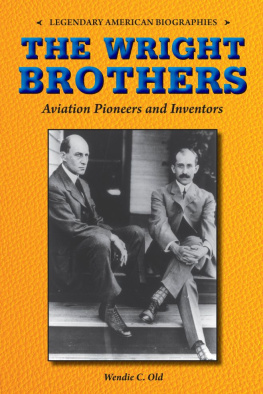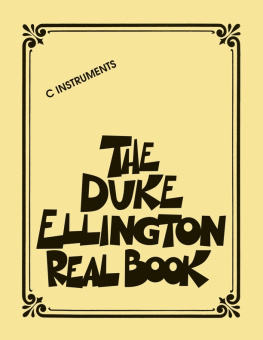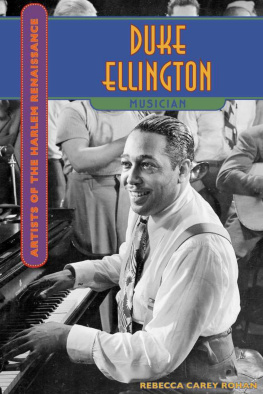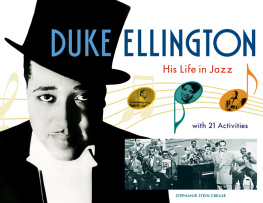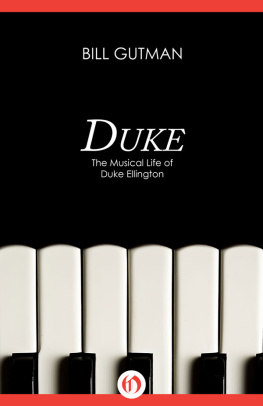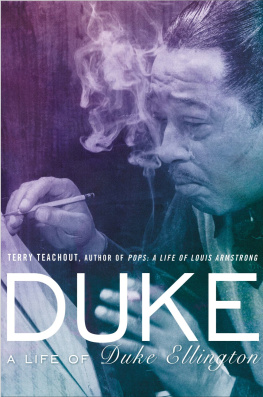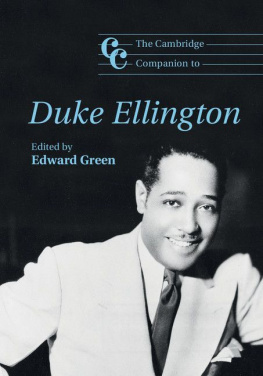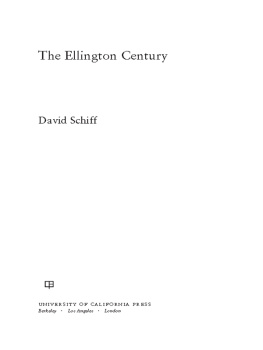Duke Ellingtons Distinctive Sound
Duke Ellingtons brilliance as a jazz composer, bandleader, and pianist has never been equalled. The winner of eleven Grammy awards, The Duke added elegance and sophistication to jazz while keeping its raw power and flavor. After first achieving success in New Yorks Cotton Club during the 1920s, Ellington went on to write the musical scores for stage plays and movies, and even composed his own short opera. His ability to improvise and use experimental sounds allowed him to prove jazz was a serious art form.
In The Life of Duke Ellington: Giant of Jazz, author Wendie C. Old examines the life and career of this music legend from his childhood in Washington, D.C., to his eventual emergence as a trendsetter in the jazz community. No one who has heard the music of this jazz giant will ever forget his distinctive sound.
Ellingtons passionhis influenceare all clearly described.
School Library Journal
Jazz buffs will enjoy this detailed account
ALMA Book Review Comm.
ABOUT THE AUTHOR
In addition to writing extensively, Wendie C. Old has worked as a childrens librarian for more than thirty-five years. She has a degree in history from West Virginia University and a masters in library science from the University of Kentucky.


Image Credit: Library of Congress
The winner of eleven Grammy awards, Duke Ellington was a brilliant jazz composer, bandleader, and pianist.
In the early 1950s, the music world whispered, Duke Ellington? His band was the greatest once upon a time. [He just] hasnt got it anymore. Ellington and his band members either had to defeat that rumor or fade away.
They hoped to regain national recognition by accepting an invitation to perform at a brand new event in summer concertsthe outdoor musical festival.
The summer band concert in the city park had been a staple of American life since the turn of the century. But there had been no place celebrating the only true American music, jazz, until 1954 when the first Newport American Jazz Festival was held in Newport, Rhode Island.
The idea was developed by George Wein, the owner of a small Boston jazz club. He convinced millionaire Louis Lorillard to help him promote the jazz festival in Freebody Park near the huge summer homes owned by the extremely rich of Boston and New York.
They invited the top jazz performers in the nation, from southern jazz bands who called themselves Dixielanders to small modern jazz quartets. The excitement of listening to all these artists in one place drew enthusiastic fans from all walks of life. If Ellington and his orchestra could sparkle in this setting, no one could accuse them of being has-beens again.
Ellington was more than just a bandleader and the conductor of fifteen talented musicians. He was the composer and arranger of the jazz music his orchestra performed. In addition, he played a little piano (as he modestly referred to his own contribution in the group), often leading the group from his piano stool.
Leading a big band is a business. Ellington sometimes also acted as manager for the group, finding jobs or gigs where they could perform. However, during the early 1950s, most of the big bands were breaking up because of the lack of gigs. People were not going to dances, filling movie houses, attending concerts, or going to vaudeville showsthe venues that used to hire the big bands. People were staying home watching a new invention called television. Advertising dollars that had supported band and orchestra concerts on radio now fed television shows. Radio stations found they could save money playing prerecorded music. Television was not interested in jazz performers. Television had decided that other types of music from classical to rock and roll had more public appeal.
Ellingtons orchestra found themselves bouncing from one one-night stand to another. Here a concert, there a dance, but no long-term gig paying enough to support fifteen musicians. Ellington often had to pay their salaries out of his own income from the sale of records.
Even though jazz was finally being taken seriously in collegesstudied and analyzed by music studentswhen colleges looked for performers to entertain their students, they invited smaller groups like those of Miles Davis and Dave Brubeck, not large bands like Duke Ellingtons.
Ellington refused to lay off musicians during the times he could not find work for them. The only reason were still in it [the music business] is mainly artistic interest, Ellington said. Were not one of those people who stay in the business only so long as business is good. We stay in it 52 weeks a year.
Besides, he needed the group. He needed to have them around in order to hear how his latest compositions sounded. He did not just write music. He wrote music for the particular instrumentalists in his orchestra. For example, if Cat Anderson could hit particularly high notes on his trumpet, Ellington wrote a section for him to shine.
He also loved the performance aspect of his music. He needed the challenge of winning over the next audience. He loved being theatrical and putting on a show.
By 1955, Ellington grabbed any musical gig he could find. The lowest point came when the group played mood music for several weeks for the Aquacades, a water show in Queens, New York. Ellington was not even hired as the conductor. The show hired his orchestra. Ellington played a medley of his hits on the piano, then left.
Despite this low period, Ellington could not stop composing. He used the free time to write a musical play, The Man with Four Sides. However, it was never performed during his lifetime.
The critics panned the show at the Aquacades, declaring that Ellington had descended to merely being a footnote to the history of jazz.
His son, Mercer, said:
... it looked like there might not be another way to come back. It looked like he might not be able to continue to help other people, relatives and friends, as he had throughout his life.... He was in management difficulties, public recognition seemed to be diminishing, and he was worried.
In April of 1956, Time magazine interviewed him for a cover story to be published later in the summer celebrating his twenty-five years as a nationally known musician. This would make him the sixteenth African American to be on the cover of Time magazine. Ellington hoped the magazine would emphasize that he was still active as a musician/composer, not simply feature his historical fame. No matter how bad things got, [Ellington] never dwelt on them, but continued to look at what he was about to do.
That year he planned to rise from the ashes at the Newport Jazz Festival of 1956. He and his orchestra had not been invited as the headliner of the show. Instead, they were invited to represent the older type of big jazz band.
In addition to the current star jazz performers, all the important people of the jazz world would be in the audience: record company executives, promoters, music publishers, magazine reviewers, and newspaper columnists and photographers, along with dedicated jazz fans.
Ellingtons record company, Columbia Records, had agreed to record his performance live at Newport. Failure or success, this attempt would be etched on vinyl for posterity. He was still backstage negotiating the fine points of the record deal at 8:30 P.M. when his band began their first set of the evening. The orchestra normally began playing Take the A Train (Ellingtons theme song) without him. Ellington would bound onto the stage, conduct the last few bars of the tune, then introduce the band members and continue the concert. This evening, when he went on stage, he discovered the group was missing four playersnot a good start for a comeback.

